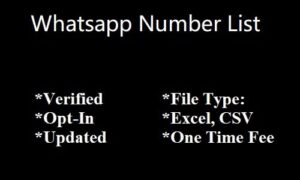WhatsApp, as a widely used messaging application, collects various types of data to offer its services efficiently. It’s essential for users to comprehend how data collection works to make informed decisions about their privacy and security. Let’s explore how WhatsApp collects and utilizes data in the messaging platform.
User Account Information:
Upon registration, WhatsApp collects basic user account information, including phone numbers. This data is necessary to create and authenticate user accounts, allowing seamless communication with friends and family.
Contact List:
WhatsApp may access and collect contact information from users’ address books. This allows the app to build a contact list and identify other users who are already on the platform, simplifying the Israel Whatsapp number Data process of connecting with contacts.
Message Metadata:
WhatsApp collects metadata related to messages, such as timestamps, sender and receiver information, and delivery status. This data is essential for message routing and ensuring messages reach their intended recipients promptly.
End-to-End Encryption:
WhatsApp implements end-to-end encryption, ensuring that messages remain private and secure. This encryption process is managed locally on users’ devices, providing an additional layer of data protection.
Media and Attachments:
When users send media files or attachments through WhatsApp, the app temporarily stores this data on its servers to facilitate smooth delivery. However, WhatsApp claims that the content is not accessible to the company due to the end-to-end encryption.
Logs and Diagnostics:
To improve the app’s performance and troubleshoot issues, WhatsApp collects certain logs and diagnostic data from users’ devices. These data points help developers identify and fix bugs and provide a better user experience.
User Interactions:
WhatsApp may collect information on how users interact with the app, such as the frequency of use, the types of content shared, and the engagement with various features. This data helps WhatsApp enhance its services based on user preferences.
Location Information:
With users’ consent, WhatsApp may access device location information to enable location-based features, such as sharing location with contacts or finding nearby businesses. However, users have the option to control location-sharing settings.
Account Status:
WhatsApp may collect data about a user’s account status, such as the last time the user accessed the app or their account deletion status. This information is utilized to manage and maintain user Asia Email List accounts effectively.
Third-Party Integrations:
WhatsApp may integrate with other Facebook products or third-party services, enabling seamless experiences and providing more personalized content for users. Users are encouraged to review the privacy policies of these integrated services.
Conclusion:
WhatsApp’s data collection practices are crucial for delivering its messaging services efficiently. While the app collects various types of data, it also emphasizes user privacy through end-to-end encryption and local management of encryption keys. Understanding how WhatsApp collects and uses data empowers users to make informed decisions about their privacy and security while enjoying the convenience of this widely popular messaging platform.

